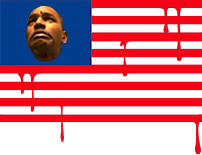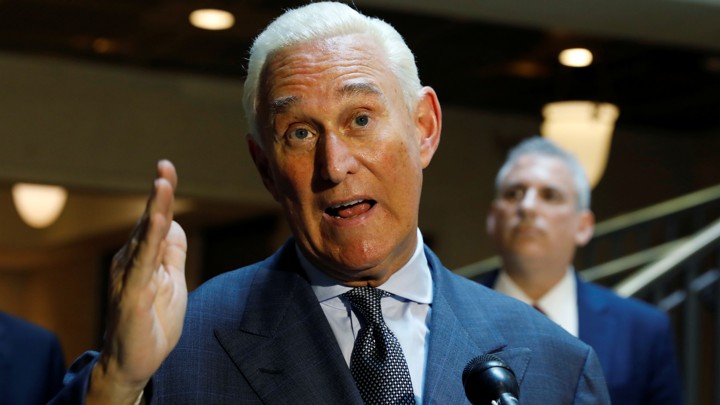The Trump Campaign Says Exploiting Hacked Emails Is Free Speech
Lawyers for the campaign asserted in court papers a right to disclose “even stolen information.”
Natasha Bertrand is a staff writer at The Atlantic where she covers national security and the intelligence community.6:00 AM ET
Former Trump campaign adviser Roger StoneKevin Lamarque / Reuters
In a motion to dismiss a new lawsuit accusing President Donald Trump’s campaign team of illegally conspiring with Russian agents to disseminate stolen emails during the election, Trump campaign lawyers have tried out a new defense: free speech.
The lawsuit, filed last month by two donors and one former employee of the Democratic National Committee, alleges that the Trump campaign, along with former Trump adviser Roger Stone, worked with Russia and WikiLeaks to publish hacked DNC emails, thereby violating their privacy.
But the Trump campaign—represented by Jeffrey Baltruzak, Michael A. Carvin, Nikki L. McArthur, and Vivek Suri, all of the law firm Jones Day—responded in a brief filed Tuesday that the campaign can’t be held legally responsible for WikiLeaks’s publication of the DNC emails.
Furthermore, the Trump lawyers argued, the First Amendment protects the campaign’s “right to disclose information—even stolen information—so long as (1) the speaker did not participate in the theft and (2) the information deals with matters of public concern.”
The motion’s language seems to further an argument made by Trump and his allies as they await the findings of Special Counsel Robert Mueller’s investigation into a potential conspiracy between the campaign and Russia in 2016: namely, that collusion, even if it involved the coordinated release and exploitation of a candidate’s emails during the presidential election, is not a crime.
In that sense, the campaign’s legal team is taking advantage of the fact that the so-called Cockrum lawsuit—which was dismissed in July but refiled last month by the two DNC donors, Roy Cockrum and Eric Schoenberg, and the former DNC employee, Scott Comer—doesn’t accuse the campaign of actually helping the Russians hack the Democratic National Committee, which would be a crime. Rather, the plaintiffs put forth their privacy argument based on the alleged coordination among the campaign, Stone, Russia, and WikiLeaks.
But the right to free speech, the campaign’s lawyers argued, supersedes the right to privacy. “At a minimum, privacy cannot justify suppressing true speech during a political campaign,” they wrote. Quoting from the Citizens United case, they added that the First Amendment leaves parties “‘free to obtain information from diverse sources in order to determine how to cast their votes.’ It would eviscerate that guarantee to punish true disclosures made in a political campaign.”
Ian Bassin, the executive director of Protect Democracy, which represents the plaintiffs in the lawsuit, told me that the brief “seems like the technical legal version of the more political argument the Trump team has been floating, and will make in earnest, should Robert Mueller eventually find that the campaign engaged in a conspiracy like the one we allege, which seems very possible given how the indictments he’s already brought line up with the complaint in this case. We of course intend to rebut that argument in the litigation, as it’s wrong.”
While there is no evidence yet that the Trump campaign knew about or aided in the hacking itself, campaign-finance laws prohibit candidates from accepting “anything of value” from a foreign national. The Trump campaign could face legal exposure, then, if a prosecutor could prove that Trump or his campaign associates made an agreement with Russia to publish the stolen emails—which were clearly valuable to the campaign, given how often Trump quoted from them during rallies—via a third party such as WikiLeaks, as Bob Bauer, a former White House counsel to President Barack Obama,
has written.
The campaign’s lawyers argued that the plaintiffs hadn’t made a “plausible” case that the campaign and the Russians engaged in a “collaborative” effort to release the plaintiffs’ emails to influence the election. But they seemed to acknowledge the emails’ value: “The DNC emails clearly deal with matters of significant public concern.”
Their argument is timely, and troubling: The midterm elections, less than 30 days away, are as vulnerable to hackers who steal information and then dump it onto the web to influence voters as the presidential election was two years ago. Both parties face high stakes: Democrats hope to take back the House and the Senate, whereas Republicans are clinging to their majorities as a wave of GOP lawmakers chooses not to run for reelection. So far, however,
only House Democrats have pledged not to use stolen or hacked materials in their campaigns this fall. As I reported last month, their Republican counterparts declined to match that commitment—and “one of the major sticking points” was how to address the press coverage of hacked materials.
“Speech deals with matters of public concern when it can be fairly considered as relating to any matter of political, social, or other concern to the community, or when it is a subject of legitimate news interest,” the Trump campaign’s lawyers wrote in their brief. They went on to justify the disclosure of the hacked materials by arguing that they were in the public interest. “Every disclosed email was (1) a work email (2) sent or received by a political operative (3) during a presidential campaign,” they wrote. “Indeed, the disclosed emails dealt pervasively with important public issues. They revealed the Democratic Party’s conduct during its presidential primaries—which are public processes ‘structur[ed] and monitor[ed]’ by the state. They revealed the DNC’s interactions with rich donors—educating citizens about the influence of ‘moneyed interests.’ And they revealed the closeness of the party’s ties to the media.” (Here, again, the lawyers seem to be emphasizing the value of the emails, which could prove
problematic with regard to campaign-finance laws.)
Experts fear that the continued use of hacked documents by campaigns only encourages cybercriminals to keep meddling in U.S. elections. While it is often difficult to differentiate between material that has been leaked and material that has been hacked, “there should be” a cohesive policy used to distinguish between the two, Clint Watts, a senior fellow at the Center for Cyber and Homeland Security at George Washington University and a Foreign Policy Research Institute fellow, told me earlier this year.
In 2017, shortly after being named CIA director, Mike Pompeo—now the secretary of state—deemed WikiLeaks a “non-state hostile intelligence service” because it provided Russia with a platform to interfere in the election. The Trump campaign’s lawyers, however, went so far as to defend the so-called radical transparency organization in their brief. “Wikileaks cannot be held liable for the publication” of the hacked DNC emails because it was merely an intermediary, and not liable for the Russians’ hack-and-dump scheme, they wrote. “A conspiracy is an agreement to commit ‘an unlawful act.’ Since WikiLeaks’ posting of emails was not an unlawful act, an alleged agreement that it should publish those emails could not have been a conspiracy.”
We want to hear what you think about this article.
Submit a letter to the editor or write to
letters@theatlantic.com.






